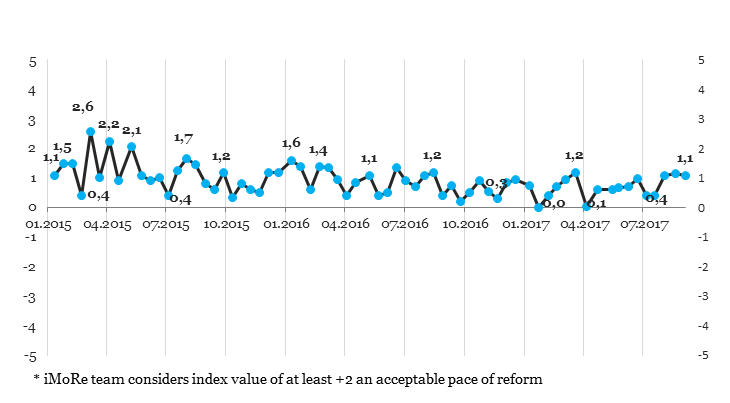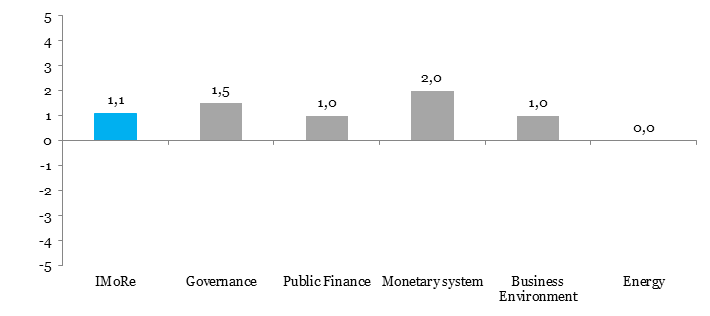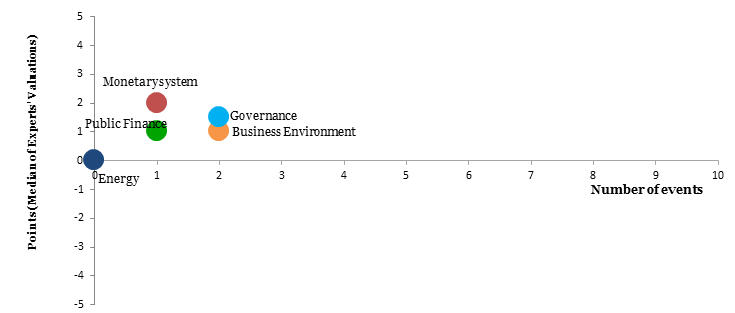Reform Index is +1.1 point on a scale of -5.0 to +5.0 for the period from August 14 to September 3, 2017 (+1.2 in the previous round). Positive developments were recorded in governance, public finance, the monetary system and the business environment. There were no reformist legislative changes affecting the energy sector.
Among the major events that occurred during this round are the government decision regarding the establishment of directorates in the structure of state bodies, where new civil servants are planned to be hired, and the NBU resolution on the use of electronic signature in the banking system.
Chart 1. Reform Index dynamics*

Chart 2. Reform Index and its components in the current round

Top-reforms of the release
- The CMU resolution on the establishment of new directorates in the structure of state bodies, +2.0 points
Inefficient state institutions remain a bottleneck in the process of reforms. That is why the civil service reform is one of the priorities of the government. The Civil Service Law adopted at the end of 2015 did not solve the problems accumulated in this area.
Now the government is making another attempt to reform the civil service. With the Resolution # 644 of August 18, 2017, the government established new units – directorates in the Secretariat of the Cabinet of Ministers, the Ministry of Agrarian Policy and Food, the Ministry of Energy and Coal Industry, the Ministry of Infrastructure, the Ministry of Culture, the Ministry of Health, the Ministry of Education and Science, the Ministry of Regional Development, construction and municipal housing economy, the Ministry of Social Policy, the Ministry of Finance, the Ministry of Justice, as well as general departments at the National Agency on Civil Service issues and State Agency for e-governance.
It is expected that the principles and rules of governance defined in SIGMA program, which is a joint initiative of the OECD and the European Union, will be implemented in these units. These units will be responsible for strategic planning in the ministries and will be directly subordinate to the state secretaries.
The specialists who will work in these units will be selected by competition, and their wages will be approximately 3-4 times higher than those in similar positions and 6-10 times higher than the average salary in the country.
- The NBU decree on the use of electronic signature in the banking system, +2.0 points
Digital technologies are gradually being introduced into the banking system of Ukraine. By replacing paper document circulation with electronic money, banks can reduce their costs and optimize business processes.
The Regulation on the application of electronic signature in the banking system, which has been recently approved by the National Bank, introduces 5 types of electronic signature that banks can use when executing, processing and storing electronic documents. Among them is a simple electronic signature, a simple electronic digital signature (EDS), EDS equal to a personal signature, EDS of a legal entity.
Each of these types of signatures provide for its features of use, as well as the requirements for the execution and storage of electronic documents in the banking system.
Chart 3. Value of Reform Index components and number of events

Reform Index aims to provide a comprehensive assessment of reform efforts by Ukraine’s authorities. The Index is based on expert assessments of changes in the regulatory environment in five areas:
- Governance
- Public Finance
- Monetary system
- Business Environment
- Energy
For details please visit reforms.voxukraine.org
Attention
The author doesn`t work for, consult to, own shares in or receive funding from any company or organization that would benefit from this article, and have no relevant affiliations



